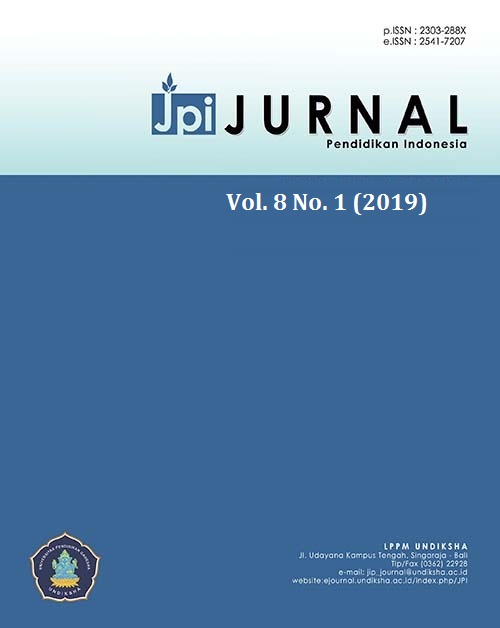Academic Learning Outcome And Creative Thinking Skills On Projectile Motion Topic
DOI:
https://doi.org/10.23887/jpi-undiksha.v8i1.14524Keywords:
academic learning outcomes, creative thinking skills, PBLAbstract
PBL is one of the constructive learning models. Therefore, the purpose of this study was to find out whether PBL was more effective in enhancing academic learning outcomes and creative thinking skills with different classes. This research was began by compiling instruments, carrying out the learning process, analyzing data, and presenting it in the form of reports. The results showed that the average value of student learning achievement was 73.29 in the experimental class and 74.40 in the control class. This average value was then tested by the hypothesis using the right tailed T-test. The right tailed T-test was used to find out whether the learning achievements of students taught with PBL were higher than those taught conventionally were. Through the T-test with the help of SPSS, the results of tcount 0.514 obtained < ttable 1,670. Conclusions from the results of the analysis show that the learning achievement of the experimental class students is smaller or equal to the control class. Data on creative skills were tested by precise nonparametric analysis, the Mann-Whitney test because data was not normally distributed. Through the Mann-Whitney analysis with the assistance of SPSS, it was obtained z values for creative thinking skills 5,608> 1,65 for creative thinking skills data. This means that the creative skills of students taught by PBL were higher than those taught conventionally were.
References
Agrahari, R. (2016). The Nature of Educational Reform and Change: From Teacher-centered to Student-centered learning. Educational Quest: An Int. J. of Education and Applied Social Sciences, 7(2), 133-139.
Akcay, B. (2009). Problem-Based Learning in Science Education. Journal of Turkish Science Education, 6(1), 26-36.
Arends, R. 2012. Learning to Teach. New York: The Me Graw-Hill Company.
Argaw, A. S., Haile, B. B., Ayalew, B. T., & Kuma, S. G. (2017). The Effect of Problem Based Learning (PBL) Instruction on Students’ Motivation and Problem-Solving Skills of Physics. EURASIA Journal of Mathematics Science and Technology Education, 13(3), 857-871.
Awaludin, A. A. R., Kurniawan, I., & Hartuti, P. M. (2017). Junior High School Student’s Reflective Thinking Process in Problem Solving Viewed from Learning Creativity. Jurnal Pendidikan Indonesia, 6(2), 154-162.
Ayyildiz, A., & Tarhan, L. (2017). Problem-Based Learning in Teaching Chemistry: Enthalpy Changes in Systems. Research in Science & Technological Education , 36(1), 35-54.
Batlolona, J. R. (2018). Model Mental Dan Keterampilan Berpikir Kreatif Fisika Siswa Melalui Model Pembelajaran Problem Based Learning (PBL) Pada Materi Elastisitas. Pascasarjana Universitas Negeri Malang. Tesis tidak di publikasikan.
Batlolona, J. R., Baskar, S., & Leasa, M. (2018). Representasi Internal Mahasiswa Pada Topik Konveksi Air. KEGURU: Jurnal Ilmu Pendidikan Dasar, 2(2), 211-221.
Cresswell & Clark. 2007. Designing and Conducting Mixed Methods Research. United States of Amerika: Sage Publication, Inc.
Inel, D., & Balim, A. G. (2010). The Effects of Using Problem-Based Learning In Science And Technology Teaching Upon Students’ Academic Achievement and Levels of Structuring Concepts. Asia-Pacific Forum on Science Learning and Teaching, 11(2), 1-23.
Leasa, M., & Corebima, A. D. (2017). The effect of numbered heads together (NHT) cooperative learning model on the cognitive achievement of students with different academic ability. IOP Conf. Series: Journal of Physics: Conf. Series, 795(012071), 1-10.
Mumford, M., & Mcintosh, T. (2017). Creative Thinking Processes: The Past and the Future. The Journal of Creative Behavior, 51(4), 317–322.
Ritter, S. M., & Mostert, N. (2017). Enhancement of Creative Thinking Skills Using a Cognitive-Based Creativity Training. Journal of Cognitive Enhancement, 1, 243–25.
Wartono, W., Diantoro, M. & Batlolona, J. R. (2018). Influence of Problem Based Learning Model on Student Creative Thinking on Elasticity Topics A Material. Jurnal Pendidikan Fisika Indonesia, 14(1), 32-39.
Williams, M. K. (2017). John Dewey in the 21st Century. Journal of Inquiry & Action in Education, 9(1), 91-102.
Yew, E. H. J., & Goh, K. (2016). Problem-Based Learning: An Overview of its Process and Impact on Learning. Health Professions Education, 2, 75–79.
Downloads
Published
Issue
Section
License
Authors who publish with the Jurnal Pendidikan Indnesia agree to the following terms:
- Authors retain copyright and grant the journal the right of first publication with the work simultaneously licensed under a Creative Commons Attribution License (CC BY-SA 4.0) that allows others to share the work with an acknowledgment of the work's authorship and initial publication in this journal.
- Authors are able to enter into separate, additional contractual arrangements for the non-exclusive distribution of the journal's published version of the work (e.g., post it to an institutional repository or publish it in a book), with an acknowledgment of its initial publication in this journal.
- Authors are permitted and encouraged to post their work online (e.g., in institutional repositories or on their website) prior to and during the submission process, as it can lead to productive exchanges, as well as earlier and greater citation of published work. (See The Effect of Open Access)








